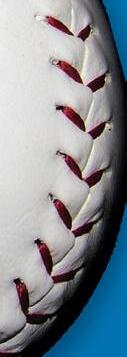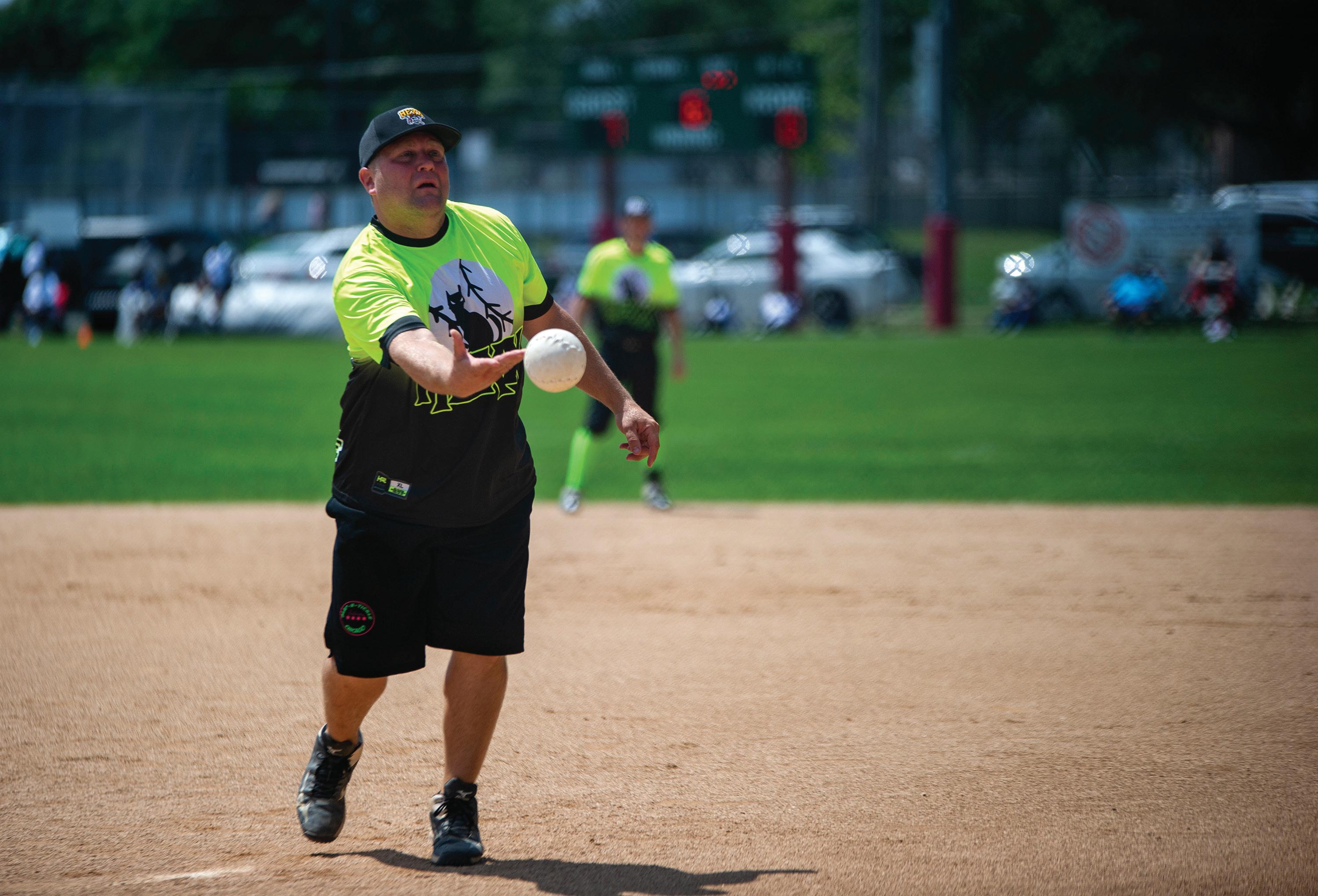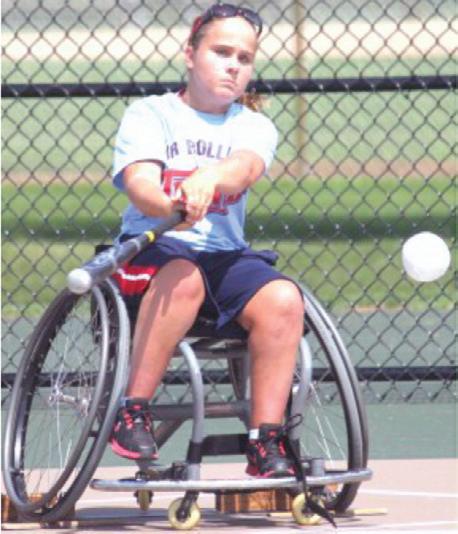










ON THE COVER: Moneyline’s short stop tags second for the out before tossing it to rst for the double play on Saturday, July 30, 2022, during the No Gloves National so ball tournament in Forest Park.












ON THE COVER: Moneyline’s short stop tags second for the out before tossing it to rst for the double play on Saturday, July 30, 2022, during the No Gloves National so ball tournament in Forest Park.

We love to see our friends and families come back and join us each year. Over 245 shifts are filled with volunteers and staf f. Volunteers cook taco’s, beef sandwiches, and sausage to name a few items. They pour beer and sell tickets. We have scorekeepers and wonderful volunteers sizing you up with merchandise! A huge thank you to all those dedicated volunteers!
Staf f continue to enjoy this long weekend. They spend countless hours here at the park! You may even find some camped out in left field! All kidding aside, staf f arrive at 7:30 a.m. and some days do not go home until the next morning around 1:00 a.m. Staff are dedicated to this event’s success!
Over the years the Park District Board of Commissioners continues to support this huge event. Each day you will find board members volunteering their time in the food tent, selling merchandise, or pouring your beer. All these hours are done voluntarily!

Once again, we cannot wait to see our fans! The park is full of fans spending countless hours cheering on their favorite team or just out to see a great softball game! It is so great to see old friends reuniting and sharing their stories, “about that one time” or “did you see that great play”!
It continues to be an honor to provide the greatest tournament! We cannot wait to see everyone. Look forward to great Softball, good food, great company on the best softball fields!
See you in the Park!
Jackie Iovinelli, Executive Director/Co-Tournament Director Park District of Forest Park
Well traveled, but softball diamond home to Brady .
A River Forest cop, Dosen balances family, work and the game
Why not a No Gloves tourney for women asks Apostolovich.
Father
Team culture is clutch for BTA as Ward works to spur team




Senior Editor Bob Uphues
Digital Manager Stacy Coleman
Contributing Reporters John Rice
Design/Production Manager Andrew Mead
Editorial Design Manager Javier Govea
Designer Susan McKelvey

Sales and Marketing Representatives Lourdes Nicholls, Marc Stopeck, Kamil Brady, Ben Stumpe
Business & Development Manager Mary Ellen Nelligan

Circulation Manager Jill Wagner
Editor and Publisher Dan Haley
Special Projects Manager Susan Walker
Board of Directors
Chair Judy Gre n
Treasurer Nile Wendorf
Deb Abrahamson, Gary Collins, Steve Edwards,Darnell Shields, Sheila Solomon, Eric Weinheimer
Executive Director Jackie Iovinelli
Superintendent of Business Je Murphy
Superintendent of Recreation Danette Krajewski
Superintendent of Facilities Andrew Doss
Recreation Supervisor Ryan Villanova
Communications and Marketing Manager Adam Cumbee ■
Board of Commissioners
President John Doss
Vice President Kristen Lyons
Commissioners Timothy Gillian
Cathleen McDer mott, Roy Sansone
PROVIDED
Mike Brady has been a model of discipline and determination. It takes discipline and a nononsense mom to have perfect attendance in grade school and high school. It takes determination to fulfill a lifelong goal of visiting all 7 continents and 50 states. Both of these strengths were on display during Brady’s 50-year softball career. That is why he is being honored this year with his plaque being displayed on the 16-inch Softball Wall of Fame.
During his long career, Brady was never involved in a fight. He has only been ejected once and his only significant injury was to an ankle. It’s even more remarkable that Brady is still playing softball at 69. “I have been incredibly blessed,” he said.

Those blessings began at St. Maurice Parish in the McKinley Park neighborhood. Brady attended the school and joined the Cub Scout troop. He was 8 or 9 when he first played softball
for the troop’s team. Softball was just one of the many sports he enjoyed back then. “We were always outside playing softball, basketball and touch football,” Brady recalled, “We didn’t need organizations to play sports.”
When it came to attending high school, Brady was destined to attend St. Ignatius College Prep. His mother, Eileen, had emigrated from impoverished County Mayo and had heard from a fellow émigré how great Ignatius was. Brady joined the high school’s baseball team which was managed by the fiery Greg Klatecki. Brady tried out for the team by hitting off a pitching machine. When he scored 18 out of a possible 20, Klatecki declared, “You’re my leadoff man.”
As a left-handed batter with good speed, Brady was an ideal leadoff man. After his freshman team finished at .500, Brady took his manager’s advice and played hardball all summer. In his senior year, the St. Ignatius baseball team won their league championship. That marked the end of Brady’s baseball career and the beginning of his softball career
When he started his studies at IIT, Brady played in a 19-and-under league at nearby Armour Square Park. IIT wasn’t a good fit, though, so Brady transferred to Loyola University. Brady
See BRADY on pa ge B6
Mike Brady, rst row, center



from page B4


took advantage of the school’s study abroad program and spent two years at Loyola’s campus in Rome. Needless to say, he didn’t play softball there.
After graduating with a degree in economics, Brady earned his master’s in finance from Northwester n’s Kellogg School of Management. This degree earned him the nickname “The Professor” on softball diamonds. Brady went to work for R. R. Donnelley printing company and played for the company softball team at Grant Park. He later switched to telecommunications, where he still works full-time.

Brady also moved on to a more competitive level of softball at Kelly Park The South Side park levied mandatory bets on games to ensure that teams played to win. It wasn’t an “earth shattering amount” but a player might spend $900 over an 18-game schedule. Brady was 25 and single and at the top of his game. “I used to play 10 games a week. Every park had a league with a waiting list. Softball was our life.”

Brady was a slap hitter, who infuriated opposing infielders by beating out routine
When he was 30, Brady married Shirley and they went on to have three kids. Shirley was tolerant of softball but when kids started arriving, Brady had to cut back on softball. “I played hard until 1989. I took off from playing in weekend tournaments in the 90’s. I also morphed into coaching.” Brady coached his two sons and daughter in youth sports
Brady played in the No Gloves in the 1980s and still attends the tournament every year “No Gloves is the way softball is meant to be played.” His team never won the tournament. Their best finish was in the top eight. Brady also played in many glove tournaments. “Gloves made a gigantic difference in the outfield and they didn’t hurt my hitting.”
Brady moved into senior softball when he was 57. “I was playing in a 50-and-over league, when I led off the game with a hit and made a one-handed catch in the outfield.” He was immediately “carded” to make sure he was old enough. Brady was later forced to move from the outfield to designated hitter.
Softball has helped him to stay in shape and led to many friendships. “I got to play against all kinds of nationalities and players of different economic levels. In softball, everyone is equal.”











That may be true but not every player gets to be on the Wall of Fame Brady’s family knows how important softball has been for him. They are all coming to Forest Park to see his plaque installed. They

Fame this year. Dosen, though, is making a name for himself in softball.
The 24-year-old will be hitting in the heart of the order when his team, Meatball City, competes in this year’s No Gloves tournament. He’ll also be using his speed to run down balls in the outfield. His team is not among the elite eight teams that received a bye but they’re still hoping to “sneak up on some teams.”

Dosen has been sneaking up on people ever since he started playing softball. The right hander first played as a fill-in for Traffic. He immediately had “beginner’s success.” Opponents underestimated the power of the 5-feet, 9-inch batter. “Nobody knew who I was so I had the element of surprise.” After seeing him hit a few homers and doubles, “they figured out I could hit.”
San Bernardino. Dosen was a 300 hitter at Cal State and admitted he “was obsessed with stats” during his college career. But like many young ballplayers, Dosen gave up on his MLB dream when he was 18.
After graduating from Cal State with a business degree, Dosen spent that first summer playing 16-inch softball in the Wheaton League. He had already been around the game his whole life and enjoyed the laid back atmosphere. College baseball may have been pressure-packed but Dosen doesn’t even know his stats in softball.
He does know that Meatball City is above .500 in the Melrose Park league this season and they’ve been undefeated in Westchester. “Making the routine plays leads to winning softball,” said Dosen. This emphasis on de-



Kathy Apostolovich started playing softball when she was 9 and hasn’t stopped since. Apostolovich is a member ofthe 16-inch Softball Hall of Fame. Her team, the Breakaways, will also be inducted into the hall this year. This attention on women’s softball led her to this suggestion: “It would be awesome to have a No Gloves tournament for women.” Advocating for women to have equal opportunities in sports has been Apostolovich’s life’swork. It has carried over to her career as a PE instructor. Apostolovich taught for 34 years, before retiring in 2020. Not one to sit still, she has returned to teaching PE part-time. Her love ofsports started when she was growing up in Bellwood. She had two older brothers and a younger sister and Apostolovich became a sports fanatic. She played soccer, baseball, softball and basketball. “I was always outside,” she said. “Tomboy” is an old-

fashioned term but Apostolovich certainly fits the description.
She may have inherited her athletic prowess from her parents. Her dad played semipro baseball and her mom was an outstanding athlete. This talent has filtered down to Apostolovich’s daughter, Danika, who plays for the Clear Ridge traveling softball team. Danika is an outfielder because, “God blessed her with speed.” The 19-year-old has earned a scholarship to play softball for St. Francis University in Joliet.
Apostolovich first started playing 16-inch softball while attending Proviso West High School. She also excelled at volleyball and played center/forward on the basketball team. She earned a volleyball scholarship to UIC, where she completed her PE degree. She went on to play beach volleyball professionally with her partner, Patti Spietz. She later coached volleyball at Morton College.
She found 16-inch softball even more challenging than volleyball. “Women have a disadvantage because they have smaller hands,” she said. Apostolovich, though, was sure handed at all the infield positions while primarily playing short center. She tended to bat second in the order, with a goal ofadvancing
runners. She noted that the women’s games tend to be low scoring. They involve “less power and more strategy.”
Apostolovich may be tall at 5-feet, 9-inches but she was more ofa place hitter than a power hitter. She was first and foremost a team player. “I hate to lose. I can’t handle playing with a bad team. I will do whatever it takes to win, including sitting on the bench.” The Breakaways became one ofthe top women’s teams and she was a mainstay.
“I would play every night ifI could. I couldn’t get enough. I would play wherever. I played three games in one night, with a bad hamstring. There was no quit.” Meanwhile, Apostolovich made a “ton offriends” in softball. She enjoyed the camaraderie ofthe Breakaways
“We had fun on and off the field,” she said. After games, they would gather at their sponsor-bar, My Mistake, at 47th and Harlem. Apostolovich believes men have an easier time finding sponsors than women. “The problem for women’s softball is lack of sponsorship.”
Besides the Breakaways, Apostolovich played on a 16-inch co-ed team at Grant Park. They took the league championship 10 years
When I was looking for a small business loan, people kept telling me to talk to FPB. After just one meeting, I completely understood what they meant.”

in a row. “With co-ed softball, the women make the difference.” There were no limits for the female players. They had to field and hit like everyone else
Today, she plays 14-inch softball in La Grange Park, 14-inch co-ed in Forest Park and 16-inch coed in Oak Brook. “I’m one of the only Breakaways who is still playing.” She admits she doesn’t have the range, speed and power that she used to. This is true of older softball players in general. “Everyone’s fighting to play catcher.”


Apostolovich is also an avid fan of the No Gloves tournament. “I haven’t missed a year of the No Gloves. I’m always sitting in centerfield for the final game. The fields are in exceptional shape for the No Gloves.” She was inducted into the Hall of Fame in 2019. She is not big on personal statistics. “I had trophies to show my stats.”

Apostolovich lamented the lack of a women’s 16inch team in Forest Park. “There’s been a decline in women’s 16-inch. Players are gravitating to 12-inch.” This is why she believes there should be a women’s No Gloves tournament. “Women would come out for that. They haven’t been showcased like men. We could have it the week before the men’s tournament and the men could stay home with the kids. It might rejuvenate women’s softball!”




from page B7



fense has earned his team invitations to the No Gloves tournament two years in a row.
“The No Gloves is recognized by everyone as the biggest and best softball tournament,” Dosen said, “It’s the highlight of the summer for us. It has an aura. The food is great and the grounds crew is like a major league crew.” Player attendance is mandatory for the tournament, so Dosen’s teammates don’t schedule weddings for the last weekend in July. Meatball City, though, isn’t just showing up, Dosen sees them making a good run at the No Gloves. “I like our chances against anyone. We can hang with any team in the tournament. Our goal is to maximize the number of games we play.” Meatball City is accustomed to the pressure of playing in close games They have also battled their way through the Loser’s Bracket at the No Gloves.
“There’s more pressure with the Loser’s Bracket,” said Dosen.



As for the team’s curious name, Dosen believes it comes from an insult hurled by someone while they were trash talking. The team is sponsored by the Berwyn Municipal Police Association Local 1 and the FOP Brotherhood of the Fallen. Being sponsored by two police unions means Meatball City doesn’t have the usual bar sponsor for team gatherings
This may be helping the team’s performance but it’s also appropriate for Dosen who is a patrol officer for the River Forest Police Department. “It was never on my radar to become a police officer,” Dosen said but so far it’s been a good fit

Softball has also been a good fit for Dosen, because he keeps his priorities straight. “Family and work come before softball,” said Dosen, “It’s not very healthy when softball takes away from family.” His wife enjoys coming out to the games and soon there will be three in the family. They were expecting their first child in mid-July.
To leave time for his family, Dosen only commits to playing one or two games on weekdays and tournaments on the week-

ends. He sees a divide between younger players like himself and older players, like his grandfather. “I didn’t grow up in the city.” He can’t picture himself playing softball every night at the local park. “You can’t sustain that nowadays. It’s recreational – not a profession.”

“Some of the older players want the game to go back to how it used to be.” Dosen doesn’t see it happening. “The world is so different now.” There are more entertainment options than softball. Dosen also believes the tournaments go on for too long. “They should end on Saturday and leave Sundays free for the family.”
He acknowledges there are not as many spectators at softball games as there once were. “But there are more eyes on the game than ever, thanks to social media.” He believes live-streaming games is increasing softball’s popularity from coast to coast.

When Dosen calls for shorter tournaments, he’s not including the iconic No Gloves.
“It draws good crowds. You don’t see anything like it anywhere else.”




















e 2022 No Glove Nationals brought crowds to e Park. Clockw ise from top le : Moneyline’s Mike Andrews (20) hits a line drive Hall of Fame Concessions’ Dylan Diveney (7) smacks the ball. Menace pitcher tosses the ball over home plate. Hexx pitcher let’s y




















There is something special about a father and son playing 16-inch softball together. Mickey Balestri and his son, Mick, share a passion for softball that shapes their relationship. It all started when Balestri was growing up in Bridgeport, playing softball at Armour Square Park, in the shadow of Comiskey Park.

Armour Square was one of three local parks where Balestri played. The others were Donovan, McGuane and Boyce. Neighbors packed these parks on weekday evenings to take in games. It was a family af fair, complete with smoke-filled air, stocked coolers and a few bets on the side.
Balestri’s first softball gig, though,
was batboy for the St. Albert the Great team. The lineup featured eight members of the Bobcats, who would later be inducted into the 16-inch Hall of Fame. At 15, he took a 14-and-under-team to a league championship. Balestri has been a player/manager ever since. “I wanted to control the game,” he said, “I wanted to organize teams, recruit players and hustle for sponsors.”
When Balestri was 16, he started playing in a league at Santa Lucia Catholic Church. The right hander played shortstop and center field. Balestri may have started his softball career at a young age but his son, Mick, was even more precocious. Mick began keeping score for his dad’s team when he was only 5. He also charted the opposing batters and ser ved as batboy. He grew up in the game the same way his dad did.
When Balestri wasn’t playing softball, he played baseball for De La Salle High School. He was a Meteor for four years and graduated in 1973. Six weeks after graduating, Balestri was hired by the City of Chicago Streets and Sanitation
Department as a tree trimmer. He continued to work for the city until his retirement in 2009. Balestri is 68 but still active in softball.

Mick has ke pt up with him through the years. When he was 16, he began playing for his dad’s team. Balestri pitched while Mick played 2nd base and right field. The right-handed batter was “real skinny” at that age and specialized in beating out infield hits. After Mick put on some weight, he became a gap hitter with power.
It was a thrill for Balestri to play alongside his son but he was still drawn to managing. “Not a lot of other players stepped up to manage teams,” he recalled. It could be a thankless job when Balestri had to act as an “adult babysitter.” But that wasn’t the case when Balestri became player/manager for Crush in 1982. The team was a powerhouse that competed at the highest level of softball. Balestri continued to manage Crush until 2018.
Mick was 18 when he joined Crush. He played right field for them in the 2000 No
Gloves tournament, where they lost to the 45’s in the championship game. That was the game that gave Mick his “five seconds of fame.” Mike North was broadcasting for Sportscast TV and Mick was running the bases. “Look at this kid fly!” said Nor th.

Mick enjoyed a stellar playing career but admired his dad’s managerial skills. “He was more knowledgeable than other players. He was a good student of the game. He did more with less. He didn’t tolerate prima donnas. He stocked his team with hitters with hard-nosed attitudes.”
Mick began pitching in 2003. Father and son have pitched against each other and continue to play together. Last year, Balestri was playing alongside Mick, when he separated his shoulder and cracked a rib. He was out for 10 weeks.
“Plenty of people are still playing,” said Balestri. “But the quality has declined.” Also, the quantity. “Neighborhood leagues were dying in the late 90’s,” said Mick, “There was no more softball being played in Bridgeport parks.”

He still believes, though, that the future of the game looks bright. Mick, who is a paralegal for a law firm, is strictly playing for park leagues now. “Park ball is the best softball I ever played. I play more now than ever. In the south suburbs, there is no shortage of softball.”

The future also looks bright for the No Gloves tournament. “It’s the granddaddy of all 16-inch tournaments,” Balestri said, “It invites the best teams, including the three best Iowa teams. Everyone comes to it. No one skips it.”



In the 1995 No Gloves, Balestri was on the mound for Dollhouse, when they beat Lettuce for the championship. “I pitched in all five games,” he said. Mick has played in 15 No Gloves tournaments. His highest finish was second with Crush.

Throughout their years in softball, father and son have maintained a healthy relationship. They can give each other a hard time without hard feelings. In 2004, Mick gave the speech when Balestri was inducted into the Hall of Fame. Balestri hopes to retur n the favor someday.

Mick sums up how he feels toward his father. “Anything I do with my dad is better than not doing it with him.” To show their appreciation for their dad, the Balestri kids bought him a brick to be installed at the Hall of Fame.
That expresses how the Balestri family feels about the game.


Mick and Balestri recently returned from watching Mick’s daughter, Kacey, play a game.
“Someone has to carry on the family name in softball,” the 12-year-old declared.











 By JOHN RICE Contributing Reporter
By JOHN RICE Contributing Reporter
BTA stands for Best Talent Assembled and they are a rising young team in the world of 16-inch softball. At last year’s No Gloves tournament, BTA battled the 45’s in what many have called ‘the game of the century.” The 45’s finally won the slugfest 14-13 in 11 innings. That night, BTA’s longtime manager, Tony Ward, couldn’t slee p. That’s because Ward had built his team with the sole purpose of knocking of f the mighty 45’s.
If you have a permanent physical disability and want to play Chicago’s great game of 16” softball, come join our wheelchair softball programs for youth and adults.



For more information, contact :
Dan Ferreira @ 312-745-2055 or daniel.ferreira@chicagoparkdistrict.com
Larry Labiak @ 312-742-5097 or larry.labiak@chicagoparkdistrict.com

Ward grew up in the neighborhood where the White Sox play. He started playing 16-inch softball at the age of 15. He played with his friends on a team called The Kings. The right-handed hitter “had a little speed back then.” He patrolled left field and batted at the top of the line-up. “I cut the ball and ke pt the fielders honest,” he said. Ward is now 62 and hasn’t missed a season since he started.
Claude Rhodes, a legendary figure in 16-inch softball, mentored Ward. Ward later started the Claude Rhodes Tournament to honor him. Rhodes and Ward have both been inducted into the Hall of Fame. In 1979, Ward joined the Flamingos and he played 11 seasons for them. In 1985, he first battled softball stalwart Mickey Balestri. They competed in tournaments at Washington Park. Ward, though, primarily played at Rosenblum Park, a 10-acre facility at 75th and Jeffrey that became a hotbed of 16-inch softball.

When he was 42, Ward switched from outfield to second base. He finally had to quit playing six years ago due to hip problems. As his playing career wound down, Ward started BTA in 2016. The team is sponsored by A Plus Cleaning and Maintenance Services. This company has hired three of the BTA players and they are not obligated to
play softball to keep their jobs. Ward is a retired CTA track inspector (“dangerous job”) who has recruited players to work for the CTA.
Ward is not just a manager but a sort of life coach. His players range in age from 22 to 28, with a few over 30. Ward gives them the opportunity to play competitive softball in the Forest Park league. He claims that Wes Shannon and Brian Blackwell are two of the fastest pl ayers in the leagu e. Leonard Harris locks down first base while batting .740.
BTA has re gular practices for young players who sometimes don’t want to put the work in. “We keep kids busy in a positive way. I call guys all the time to eat together, play cards together. We have a team structure not I-I-I.” Still, it’s a challenge to keep players from going to another sport. His third basemen, for example, wants to play football.
It’s also a challenge to keep them focused
tions. He sees social media, for example, as a “Separator. It doesn’t help with unity. We keep all their phones lined-up in the dugout and no one uses them.” BTA is built around defense and has a mantra: no extra outs. “We have a good shortstop and left fielder and a solid pitcher.” Ward believes the key to pitching is to throw deep strikes. “It keeps the batters of f balance. We can’t keep them from hitting but we can make them uncomfortable.”
BTA is making lots of opponents uncomfortable. “We are no longer a big fish in a small pond,” Ward says. As one opponent predicted, “If BTA stays together, they’ll make a lot ofnoise.” While Ward keeps the team’s chemistry going, opposing teams realize that BTA is no fluke. During Ward’s 14-year tenure, the team has won two major championships but has yet to win the No Gloves.



Ward first started watching the No Gloves in 1979. He saw the 1980 Flamingos beat the Bobcats on a controversial call. Black teams were not as well re presented back then but Ward says some teams were simply
not

good enough. Ward has played in the No Gloves six times but never won a championship. His team’s best finish was 8th place.
Ward echoes many when he declares the Forest Park fields as the best in all of softball. He also believes the live streaming ofsoftball games is elevating the game and bringing it into the 21st Century. “The game is going to reach new heights.”


BTA is also seeking new heights. This year, they will be fully loaded for the No Gloves. “We will have all ofour players for four days,” Ward said. They’re entering the tournament on a high note having defeated the 45’s twice to take the Mid-Summer Classic tournament.

Who knows, maybe BTA and the 45’s will play another “game of the century” this year.




The Chicago 16 Inch Softball Hall of Fame was founded in 1996. It is a 501(c)3 nonprofit dedicated to preserving the history, recognizing the best of the best on and off the field, and to fostering the growth of the 16 inch game. The 16 Inch Hall of Fame is located in Forest Park, IL. at the corner of Des Plaines and Harrison. Inductee Park was unveiled in 2009 and the museum opened in 2014. Since its inception, the HOF has inducted over 600 former and current softball men and women players, umpires, managers, fans, teams and organizers at annual dinners averaging 500 attendees. Come see our historical photos, videos, uniforms, artifacts and interactive displays on Saturdays from noon to 4pm; with extended hours during the Forest Park Tournament. Always looking for memorabilia, sponsors, and donors; support will allow us to add displays and be open longer.














A special thank you to our volunteers for helping
